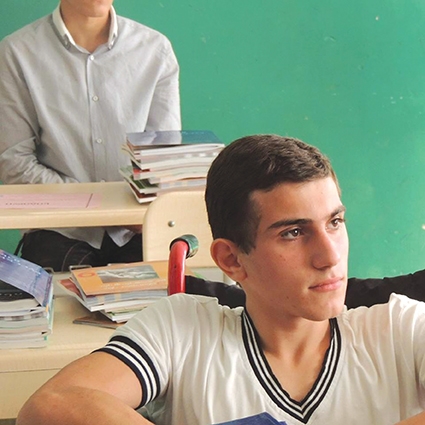Hear the Voice of the Georgian Disabled
Hello, I’m Tedo Iobidze from Kutaisi. In this short letter, I would like to acquaint you with a few successful projects recently implemented for the disabled throughout Georgia, as well as to discuss some of the problems young persons with disabilities encounter in their daily lives here.
In reality, quite a few encouraging projects have been carried out for the social integration of persons with disabilities over the last decade. Still, unfortunately, we witness numerous undesirable consequences either due to a lack of competence, to negligence, or for other reasons relating to the needs of this segment of the population. For instance, you can see sidewalks with ramps, which, instead of easing independent access, often present additional barriers for the target group.
Of course, the provision of facilities for persons with disabilities in public and private spaces is an ongoing process all over the country. And while it is a very positive practice, as I mentioned above, these developments often fail to meet the usual standards, making the good intentions meant by implementing them ineffective. Access to public transport remains a major hurdle for persons with disabilities and, aside from the capital city, Tbilisi, where the introduction of adapted transportation means is a recent undertaking, the same prospect remains an anticipated luxury, beyond the horizon for the other towns and cities of Georgia.
In my opinion, the development of Para Sports in Georgia could have a profound effect on the social integration of persons with disabilities, potentially doubling their willingness to accept challenges independently and achieve success. Impressive examples in this field have been provided by sportspersons Irma Khetsuriani and Zviad Gogochuri.
Important projects are being implemented in the direction of inclusive education, which should also to be assessed as an unquestioningly vital link for social integration of those with disabilities.
Above all, we have to change public opinion with regard to the exaggerated attentions and inaccurate terms currently employed by Georgian society when dealing with persons with disabilities. The problems that persons with disabilities have and wrestle with are serious and should be seen and heard by society as a whole. I understand that they cannot be solved in one fell swoop; but be it in a day or a year, if the sustainable positive tendencies of society are continued, positive outcomes will soon stand prominent.
COMMENT FROM Mladen Petrov
At the far end of Ureki there is an old building, conveniently located right on the beach. The building is hardly glamorous, but nevertheless it is of extreme importance: every summer, buses pick up children and teenagers with disabilities from all over Georgia and bring them here, Ureki being their much anticipated vacation spot. It was on this beach that I saw the same scene day after day: a loving tiny grandma pushing her grandson's wheelchair to the water’s edge. It was a gruesome task: the ramp ends halfway across the sand, leaving those wheelchair-bound somewhat stranded and wondering how to make it those few extra meters to the cool, pleasant water. So close and yet so far. My friend Tedo is a bright high school student from Kutaisi. For the two years I've known him, I never heard him complaining, though he is one of those who is wheelchair-bound. A fluent English speaker, he is graduating from Public School #6 in Kutaisi this May. He wants to travel- Iceland was his dream destination when we met, and to be a journalist. I'm sure he will soon achieve both. I wanted him to be able to report on the situation of people with disabilities in Georgia...and so here is his letter.












